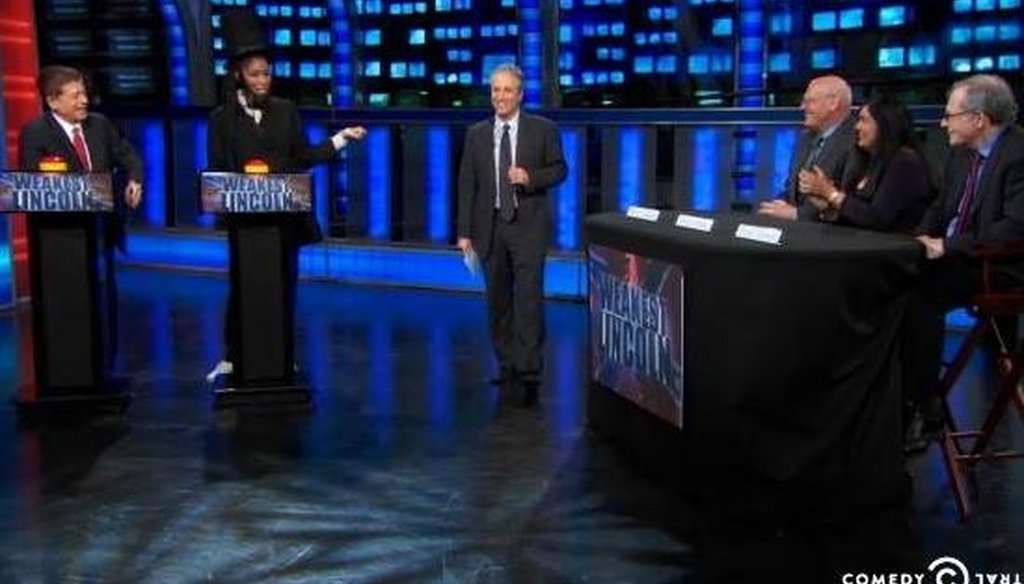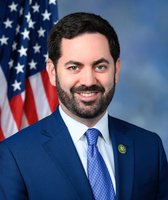Stand up for the facts!
Our only agenda is to publish the truth so you can be an informed participant in democracy.
We need your help.
I would like to contribute

Jon Stewart and Andrew Napolitano debated Abraham Lincoln and the Civil War recently. We decided to fact-check several claims.
In proof that the past is never settled business, Daily Show host Jon Stewart and Judge Andrew Napolitano of Fox News threw down last week over whether the Civil War needed to happen. Napolitano argued that the bloody conflict was President Abraham Lincoln’s war by choice. Stewart couldn’t see how Napolitano, a libertarian, could oppose a war against the ultimate denial of freedom, American slavery.
We checked four claims from their energetic debate, two from each of them. Neither passed with flying colors.
Stewart: Lincoln tried to pay to free the slaves but found no takers
One of Napolitano’s arguments was that Lincoln could have bought the slaves and freed them and saved thousands of lives and billions of dollars. Stewart said Lincoln did try to buy the slaves, but the states and slave owners weren’t interested. We found that Lincoln had put over $700,000 dollars on the table to liberate Delaware’s slaves and, as Stewart said, the Delaware Legislature said no thanks.
Lincoln also got Congress to approve a slave purchase bill, but there was never any indication that slaveholders in any Union or Confederate state were ready to negotiate. Soon after, Lincoln announced his Emancipation Proclamation freeing all slaves in the Confederate states.
Sign up for PolitiFact texts
Stewart’s claim rates True.
Napolitano: Lincoln tried to arm the slaves
Napolitano might not have wanted Lincoln to go to war to free the slaves, but he had no problem if the slaves rose up to free themselves. When Stewart pointed out how impossible that would be for slaves, Napolitano said that Lincoln had tried to arm the slaves.
"If the slaves had gone to war against their slave owners, and I had been alive, I would have been with them. I would have helped finance, fund and lead that revolt," Napolitano said.
"Are you familiar with slavery?" Stewart asked.
"I am very familiar with it," responded Napolitano.
"That is not the option," Stewart said.
"No, no, no. Lincoln tried to arm the slaves," answered Napolitano.
Napolitano gave us no proof (we didn’t hear from him at all) and two prominent historians said they had never heard of such an effort.
"I know of no evidence -- have never even heard it said -- that Lincoln himself tried to arm those who were still slaves to enable a slave insurrection -- and I very strongly doubt that any such evidence exists," said Bruce Levine, a Civil War historian at the University of Illinois.
We rate this claim Pants on Fire.
Stewart: The American slave trade caused at least 5 million deaths
When Napolitano said Lincoln could have avoided a war that cost the lives of about 785,000 people, Stewart said the American slave trade had cost at least 5 million lives.
But in doing so, Stewart appears to have mixed up the Atlantic slave trade with the American slave trade.
A historian who appeared on The Daily Show said the slave trade might have caused as many as 5 million deaths, but she was talking about the entire Atlantic slave trade. Only three percent of the slaves shipped from Africa to the Western Hemisphere wound up in North America, experts told us.
Historian Herbert Klein of Columbia and Stanford universities, who worked on a database to quantify the slave trade, said that the data suggest about 85,000 people destined for North America did not survive the trip across the Atlantic -- far below 5 million.
While there is no fully accurate tally of the death toll due to slavery, we found no evidence that the number even approaches 5 million. We rate the claim False.
Napolitano: Lincoln enforced the Fugitive Slave Act
Among the steps Napolitano said Lincoln could have taken before going to war would have been to stop sending escaped slaves back to their owners. To hear him tell it, Lincoln and other federal officials worked at this throughout the Civil War.
"If there is ever any use of federal power that is justified, would it not be to end the most horrific, abhorrent practice in the history of mankind?" Stewart asked Napolitano.
"After it had tried everything else," Napolitano said. "Like abolishing the Fugitive Slave Act, which Lincoln enforced and his judges enforced and his federal marshals enforced until the Civil War was over and Lincoln was nearly dead."
The Fugitive Slave Act of 1850 made it easier for slave owners to use the federal government to get back the people who had escaped bondage. If a person found refuge in a free state, the act expanded the number of federal officials who could order their rendition back into slavery. The act also simplified the legal steps required by the owner to prove his claim and required the state to bear any costs involved.
While there were cases when Lincoln enforced the law during the Civil War, he did so selectively when he thought it would help keep border states in the Union fold.
When it came to slaves from Confederate states, the weight of the government actions fell heavily on the side of refusing to return escaped slaves.
At the least, Napolitano gets his dates wrong. Congress repealed the Fugitive Slave Act in 1864, a year before the war ended.
We rate this claim Mostly False.
As part of our ongoing work with the reddit community, we got enormous help from members of the askhistorians group in the pursuit of these fact-checks. We thank them for their assistance and ask others to join our new reddit community.
Our Sources
See individual fact-checks.




















































